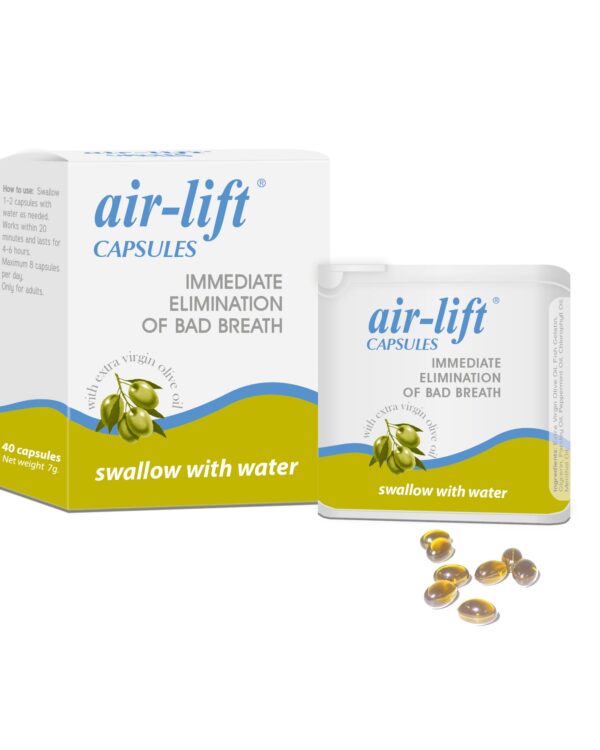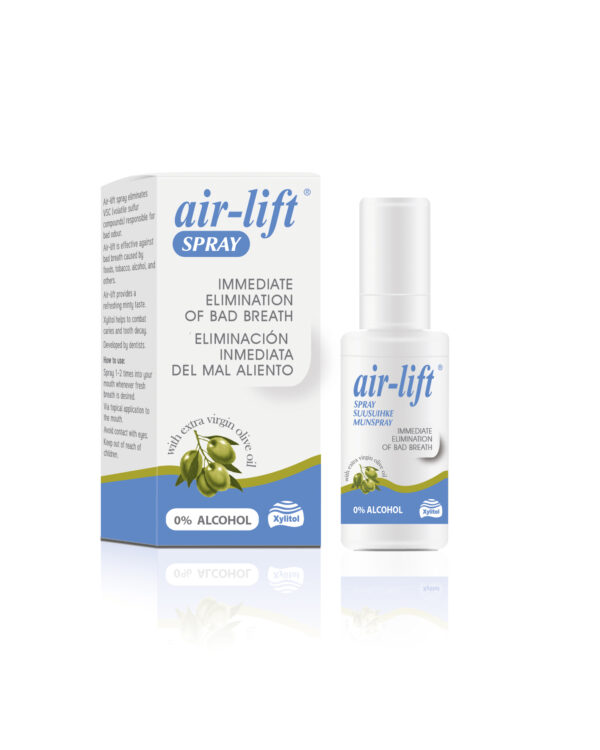With Extra Virgin Olive Oil and Mediterranean essential oils
Trust yourself
Air-Lift®, is formulated with a patented combination that includes Extra Virgin Olive Oil and other essential oils. Thanks to this, it acts exactly where the Volatile Sulfur Compounds (VSCs) originate, which are responsible for bad breath. It captures and eliminates them without altering the natural balance of the mouth or affecting its flora..

Did you know that more than 50% of adults suffer from bad breath at some point in their lives?
Enjoy fresh breath with Air-Lift®
Our Products
It helps neutralize smelly gases (Volatile Sulfur Compounds) and provides freshness for 24 hours.
Oral solution that helps combat bad breath while leaving a pleasant sensation of freshness in the mouth.

Bad breath is the worst enemy of pleasurable sexual relationships. It also causes isolation, low self-esteem, stress, and anxiety
Frequently Asked Questions
Bad breath is a very common problem affecting around 30% of the global population.
Bad breath is the general term that describes the unpleasant odor we exhale from the mouth.
Bad breath or halitosis severely impacts the patient’s quality of life.
- Presence of bacteria in the mouth that degrade food remains.
Our mouth harbors over three million types of bacteria, some of which feed on the proteins of food residues, producing a foul smell. - Dry mouth, especially in the morning or after long fasts
- Consumption of certain foods such as garlic, onion, coffee, etc.
- Poor oral hygiene. Neglecting dental hygiene and not visiting your dentist for cleanings twice a year. If we don’t brush our teeth two or three times a day or use dental floss and interdental brushes, food particles remain, rot, decompose, and cause bad breath. A transparent, sticky film of bacteria—plaque—forms on the teeth, and if not removed, it can irritate the gums. Over time, plaque pockets can form between the teeth and gums, leading to gingivitis.
- Use of poorly sanitized prosthetics or oral devices.
- Medications that cause dry mouth (more than 1,500 can cause this). Antihistamines, antibiotics, antidepressants… The body metabolizes them and releases chemical substances that can be transferred to the breath.
- Smoking and postnasal drip. Tobacco and its derivatives, which also increase gum problems. Other infections or persistent inflammation of the nose, sinuses, or throat can lead to postnasal drip — that is, mucus dripping down the back of the throat — which causes bad breath.
- Infections in the mouth, surgical wounds, or mouth sores can cause bad breath. There are also other extra-oral causes of bad breath that must be specifically treated by the appropriate medical specialist (conditions such as diabetes, acid reflux, liver or kidney diseases, etc., which can cause bad breath)
Halitosis or bad breath is classified into different types depending on its origin: oral (90% of cases), internal halitosis (which requires diagnosis and specialized treatment by the appropriate medical specialist), morning halitosis, or chronic halitosis.
There are also psychological forms of halitosis, such as pseudohalitosis or halitophobia. In both cases, there is no actual bad odor, but the person believes there is, experiencing the same insecurities, and many end up seeking psychological help.
In general, the vast majority of halitosis originates in the mouth and is the result of poor oral hygiene habits or the consumption of strong or spicy foods such as garlic or onion.
Stomach-related halitosis can be a sign of an underlying illness, even a serious one like a stomach ulcer, but it may also be caused temporarily by difficult digestion.
Morning halitosis, or morning breath, can appear even if we have excellent hygiene habits. This is mainly due to insufficient saliva production during the night.
Chronic halitosis is a type of bad breath that doesn’t necessarily occur constantly but appears in recurring episodes throughout the individual’s life and requires medical attention.
There is a common belief that stomach-origin halitosis is one of the most frequent types, but in reality, most causes of bad breath do not come from the stomach, but from the mouth. In fact, in 90% of cases, halitosis originates in the oral cavity, and more than half of those cases are related to gum disease.
To prevent halitosis, it is essential to maintain good oral health.
Although bad breath that comes from the stomach is more difficult to eliminate, the patented formula of Air-Lift® capsules helps combat it naturally in just 20 minutes after ingestion. The olive oil particles coat and absorb the Volatile Sulfur Compounds (VSCs), eliminating them through the intestinal tract. Additionally, the essential oils rise from the stomach and leave a fresh mint flavor, which helps boost self-confidence.
Halitosis is usually more intense early in the morning, after waking up, because the bacteria in the mouth have had many hours to multiply across the oral surfaces. In addition, saliva production decreases during the night, which contributes to the increase in odor intensity—something that worsens if you sleep with your mouth open. The same can happen during the day after several hours of fasting or after speaking for a long time, as a dry mouth allows bacteria to thrive..
Solutions for bad breath begin with identifying the causes of halitosis. In most cases, this problem is related to oral issues (infections, dryness, bacteria…) or inadequate oral hygiene. To combat it, it is important to consider the following:
- Improve hygiene habits: Brush your teeth, gums, and tongue after every meal using a fluoride-rich toothpaste. Also use dental floss and mouthwash to clean areas that are hard to reach with a toothbrush.
- Visit your dentist regularly: At least once a year, to prevent cavities or other dental conditions, ensure dental restorations are in good condition, and remove tartar with a professional cleaning.
- Avoid risk factors: Quitting smoking, avoiding alcohol, and reducing foods that contribute to bad breath—such as spicy dishes, garlic, and onion—are key measures to control halitosis.
- Use products for bad breath: Sprays, capsules, or other specific products can help freshen your breath.
If bad breath persists, it is important to consult a specialized professional to obtain an accurate diagnosis.
VSCs are the compounds responsible for bad breath.
Our mouth harbors millions of bacteria and over 600 different species.
The bacteria themselves do not smell bad, but they are responsible for breaking down proteins from food particles and cells.
As these proteins decompose, they produce sulfur-containing gas molecules that smell unpleasant.
These gases are called Volatile Sulfur Compounds (VSCs).
No, none of the Air-Lift products contain gluten or lactose in their formulation..


